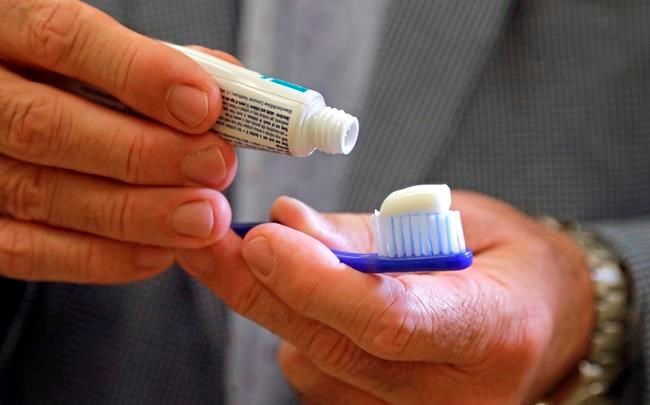MONTREAL — Kids could benefit from some extra help when it comes to brushing their teeth, but saddling teachers with supervising the daily task isn't the way to go about it, according to Quebec parents.
Katherine Korakis, the head of the English Parents' Committee Association of Quebec, found out about the province's supervised tooth-brushing program this week — like many other parents.
The program, slowly rolling out across the province, requires daycare educators and primary school teachers to supervise a two-minute tooth-brushing session every day. Teachers must also ensure the kids wash their hands before and after brushing — and make sure the toothbrushes don't come into contact with each other. As well, only two children at a time are allowed to use the sink.
"I think it's a good thing, I think that it's important. I just think the way they are executing it is not the right way," Korakis said. "I think it's a lot to put on teachers when we have a shortage in Quebec .… It would make more sense to have community organizations or dental associations to come in and do those workshops."
The program was developed by the Health Department in 2017 but was slow to be implemented because of the COVID-19 pandemic, with health workers reassigned to other tasks. A summary of the program says it's based on several others that exist across Canada and internationally, all with good results, in particular when it comes to children from disadvantaged communities.
By 2025, the Health Department hopes the program covers 80 per cent of elementary-school kids and 65 per cent of daycare-aged kids across the province.
But teachers unions say their members don't have time to supervise children brushing their teeth every day, amid mounting workloads and a labour shortage. Josée Scalabrini, president of the Fédération des syndicats de l'enseignement, which represents 87,000 teachers, said the program is a good idea but entirely unrealistic.
"Teachers have enough to do without us starting to … supervise the brushing of students' teeth," Scalabrini said in a statement. "Let's start by solving the problem of (teacher) shortages and then we will look at who can replace the tooth fairy."
Mélanie Hubert, president of the Fédération autonome de l'enseignement, which counts more than 60,000 members, said the requirements for the program are completely disconnected from the reality in schools. Hubert said there's no doubt that teachers want students to adopt healthy lifestyle habits, including brushing their teeth.
"Is this the most optimal and adequate use of teachers' time and expertise, particularly in times of staff shortages … asking them to supervise the brushing of their students' teeth?" Hubert said.
For her part, Korakis recalled that when she was in school, a woman — who wasn't the teacher — helped her class learn to properly brush with a set of big plastic teeth, a large toothbrush and floss. It's a lesson she still remembers vividly today.
She also acknowledges that different parents have different realities and not everyone is able to enforce brushing at home.
"What I've learned is that when it comes from somebody else's mouth (rather) than the parents' mouth, children tend to listen to that more," Korakis said, adding it's a task that could be given to community groups, dental associations or even representatives from private industry.
"But putting this on the backs of teachers, who already have so many things to do, is absolutely not the right way to go about this," she said.
In a statement, the Education Department said the rollout of the program involves individual regional health authorities. The department did not have an exact number for how many schools are involved.
"Note that the implementation of this program has been done gradually, on a voluntary basis, since 2017," spokesman Bryan St-Louis wrote in an email. "It is up to the schools to choose whether or not to participate. The objective is to raise awareness and promote good dental hygiene among young people."
Heidi Yetman, president of the Quebec Provincial Association of Teachers, said her organization wasn't consulted about the program and started hearing whispers about it in the past week.
"This is a big concern considering it involves the workload of our members," Yetman said. "It would have been nice to have been consulted on something as big as this because it's quite a responsibility to give to teachers."
Yetman said teachers have increasingly taken on tasks during the COVID-19 pandemic, including mask enforcement and disinfection. She said she will tell her members that dental hygiene is not part of a teacher's responsibilities.
"If you look at our collective agreement, there's a list of responsibilities and teeth brushing is not one of them," Yetman said.
This report by The Canadian Press was first published Oct. 7, 2022.
Sidhartha Banerjee, The Canadian Press



